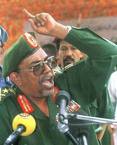
THURSDAY UPDATE: Media outlets are now reporting that Ugandan President Yoweri Museveni told President Bashir in a telephone conversation that Oryem’s statement supporting the ICC and Uganda’s adherence to the Rome Statute was not reflective of his administration’s policy. BBC notes, “President Museveni said Mr Okello was not mandated to speak on behalf of the government on the issue.” Statements from Museveni’s office are expected before the end of the week, and we will make sure to keep you updated.
…
As you’ve likely heard by now, Uganda’s minister for international affairs announced this week that his country would arrest Sudanese president Omar al-Bashir if he travels to Uganda. Given that Bashir is wanted for allegedly orchestrating war crimes and crimes against humanity in Darfur, which has led to the deaths of hundreds of thousands and the displacement of nearly 2.5 million, Uganda’s willingness to press for justice is a welcome move. Unfortunately, it is also a rare one since it necessarily means breaking ranks with the African Union, which pronounced its opposition to the Bashir arrest warrant at its annual summit earlier this month.
Uganda’s announcement came at a joint press conference in Kampala by Minister of International Affairs Henry Okello Oryem and the chief prosecutor of the International Criminal Court, Luis Moreno-Ocampo. Oryem noted that an arrest warrant for Bashir had been filed in Uganda, and that his country maintains an “unwavering” commitment to the ICC statute.
And to the 29 other African states party to the ICC statute that might have been listening, Ocampo emphasized that cooperation with the Court should not be manipulated for political aims:
It’s a legal obligation not a political decision, it’s a court decision and Uganda, South Africa and the 30 African (member) state parties have this legal obligation, it’s clear.
From Enough’s conversations with people familiar with the AU negotiations that led to the rejection of the ICC arrest warrant for Bashir, the language of the AU’s statement was hotly contested and the final version did not represent consensus; there are certainly more countries voicing support behind-the-scenes for ICC’s work to hold Bashir accountable than one might surmise from news reports. However, explicit statements of commitment to the ICC statute, like Uganda’s, are needed right now to counter the attack by vocal critics like those who turned out in force at the AU’s summit. In particular, as David recently noted, Uganda was among the countries whose silence on the AU’s decision was conspicuous, given that it has already referred cases to the Court.
As the Darfur crisis continues – six years and counting – and a return to civil war between northern and southern Sudan looks ever more likely, the man leading the regime in Khartoum, who has overseen the past 20 years of conflict in Sudan, traipses around the continent flouting justice. He will no doubt continue to do so until countries – acting in accordance with their obligations to the ICC statute and/or on behalf of millions of Sudanese victims – take a public stand and say enough is enough.
So far, the tally stands at two: Botswana, whose government expressed last week its opposition to the AU’s ruling, and now Uganda.
Photo: Sudanese President Omar al-Bashir at a rally.

